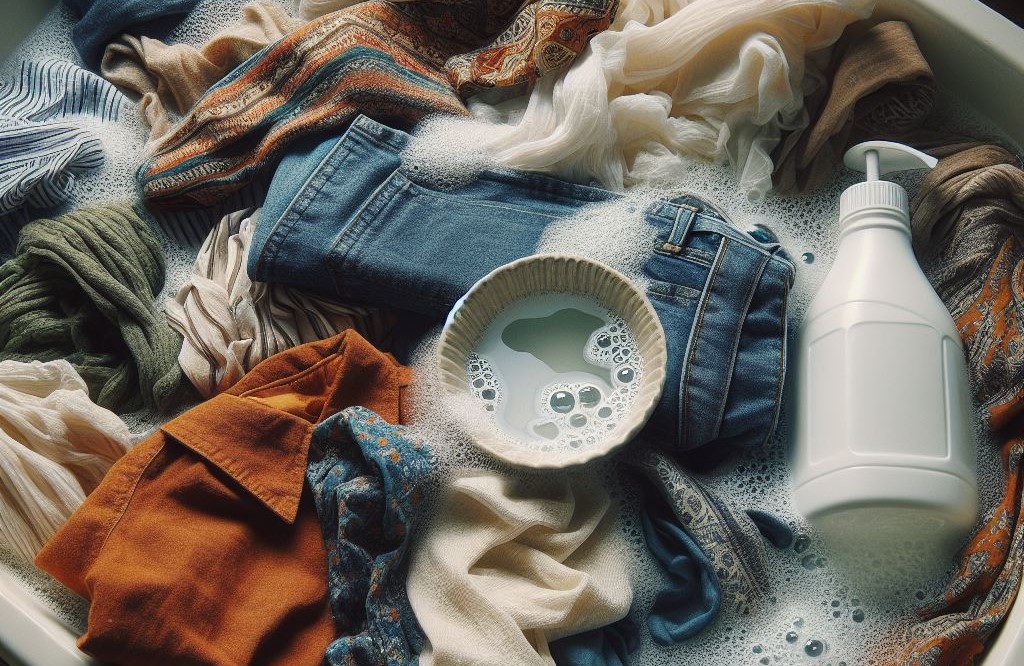Laundry On New Year’s Day: The Fascinating Superstitions Around Washing Clothes on New Year Day
As the New Year nears and the holiday season winds down, people all over the world prepare to welcome the coming year with celebrations and traditions aimed at bringing good fortune in the next 12 months. But while sparkling wine, midnight kisses, and resolutions set positive intentions for the new year, some peculiar superstitions actually instruct us not to clean up as the clock strikes midnight on New Year’s Eve.
Yes, you read that correctly – according to folklore and old wives’ tales, doing laundry on New Year’s Day can bring your household bad luck for the entire year ahead!
It may sound absolutely bonkers to modern minds and laundry-savvy homemakers. But these ideas around laundering on the first day of the year have extremely long histories behind them.
So before you blithely throw in a wash load on January 1st, make sure you know what New Year’s Day laundry superstitions dictate. Understanding the stories and origins behind these traditions just may make you think twice before messing around with the supernatural forces that supposedly govern washing clothes at the start of a new year!
Table of Contents
New Year’s Day Superstitions Around Laundry Have Surprisingly Deep Roots
As the clock ticks closer to the stroke of midnight on New Year’s Eve and the new year begins, people around the world engage in all sorts of special rituals intended to court good fortune in the coming 12 months.
Traditions like kissing loved ones at midnight, eating grapes or black-eyed peas, and singing “Auld Lang Syne” are new year’s customs many of us expect. But prohibitions on laundry on January 1st often catch people by surprise.
Where did notions about bad luck from washing clothes on the first day of the new year come from? For a practice that seems so odd today, the superstitions around New Year’s Day laundry actually have very deep roots.
Laundry Taboos Tie Into Spiritual New Year’s Cleansing Ritions
Scholars trace modern laundry bans back to the idea of spiritual cleansing for a fresh start held by our ancestors. In the pagan Gaelic regions of the British Isles, people believed evil spirits gathered around homes during the 12 Days of Christmas.
Come New Year’s Eve, these spirits had to be ritually banished before January 1st to secure good luck for the household. Fire and water purifications achieved the cleansing – which may be why Scotch/Irish New Year’s traditions involve taking a circuit of the home clockwise with burning juniper boughs followed by sprinkling blessed water.
With this notion of ritual spiritual cleansing already established, communities further enriched the New Year’s rites by incorporating . One way to consecrate the first footstep into a home or over a threshold in the New Year was to have a tall, dark, and handsome man be the first-footer.
The first-foot should also carry gifts of food, drink, or fuel for the family’s hearth fire. Having the right first-foot on New Year’s Day was considered critical to ensure ongoing prosperity.
The Link Between Laundry and Death Made It Taboo
Besides banishing evil influences, our pagan ancestors also viewed New Year’s as a dangerous liminal time when ghosts walked the earth. The scattering ashes of the Hogmanay bonfires in Scotland kept evil from doors till morning.
But in Ireland, superstition held the gates of heaven and hell swing open at midnight on New Year’s Eve and did not close until sunrise. This belief clearly connects New Year’s Day with death. And therein lies the laundry taboo!
Washing clothes has a long association with death in British folklore. It was traditionally women who laid out the dead for burial, and this included washing the body. Naturally, the wash water used on the deceased was seen as unlucky.
For centuries, laundry wash water was poured out the back door to prevent a ghost from entering along with it. A banshee might also curse any wash with her touch.
Given the supernatural dangers laundry wash waters posed, people saw washing on New Year’s Day as likely courting disaster. With death felt so near that day, no one wanted to invite it into their homes through laundry. So the custom took hold.
4 Enduring New Year’s Superstitions Around Laundry

While beliefs around ritual cleansing and supernatural dangers on New Year’s Eve have faded over time, the laundry taboos associated with those old ideas continue to persist.
Usually, the worse the punishment for breaking the superstitions, the more seriously people heed them! When entire households or communities could be cursed with tragedy for a year, people quite sensibly avoided doing laundry to start the year.
The specific New Year’s Day rules concerning laundry also evolved over the centuries. But a core group of common superstitions around washing on January 1st took hold across the British Isles.
1. Don’t Wash Clothes
This is the cardinal rule around laundry on New Year’s Day. By far, the most ubiquitous superstition cautions people flat out not to wash clothes on January 1st or risk grave misfortunes.
Most warnings specify disasters for the whole household if laundry happens New Year’s Day. Illness, death, losing a loved one, financial ruin, accidents, family strife and fighting…the variations on possible bad luck are wide-ranging and awful.
In a particularly grim Scottish legend from Aberdeenshire, a woman decided to wash on January 1st with near catastrophic results. She had just finished the laundry when word arrived that her husband had drowned at sea. Then she scalded herself terribly pulling clothes from the boiling pot, losing skin from fingertips to elbow.
With tales like those circulating for generations, it’s no wonder every Scottish child learned you must never wash on New Year’s Day!
2. Don’t Hang Laundry Outside to Dry
Given laundry itself was forbidden, obviously wet laundry had no business airing outside either on January 1st. Which yields the second most common New Year’s laundry superstition: no hanging washing out on New Year’s Day.
This rule always gets paired to the first rule. Obeying one but not the other still dooms you! In some tellings, this superstition is more specific. Just bring in any laundry still drying outside from the day before New Year’s Eve.
Leaving it out overnight means that in the morning it will belong to the fairies or pookas. You don’t get it back – and likely your luck has soured too!
3. Don’t Lend Laundry Equipment
The third widespread superstition around laundry on New Year’s Day extends the prohibitions outwards. Not only must you avoid doing laundry in your own home, but it’s equally bad luck to lend tools of laundry labor to neighbors on January 1st!
Specifically, that means no lending out your wash tub, washboard, laundry tongs, boiling pot, or mangle rollers for laundering. Some versions single out your mangle rollers – allowing their use to squeeze luck or prosperity from your home over the next year.
In an interesting twist, one much less common encouragement is to make sure you borrow laundry equipment on New Years Day rather than lend any out. Scottish and English lore claims starting the New Year by borrowing brings you luck and prosperity. The more people who ask to borrow from you, the better fortune coming your way!
4. Don’t Mop or Sweep Floors
Beyond just laundry, January 1st taboos broaden out to general washing or sweeping indoors as well. So the fourth common superstition instructs people not to mop floors or sweep up fireplace ashes on New Year’s Day.
This ties back to rituals banishing last year’s evil spirits from the home before the stroke of midnight. Afterwards, the logic flips – sweeping or mopping can sweep luck right out the door! Or sweep away a family member who subsequently dies.
Yet again, borrowing defies the rule. Superstition encourages borrowing brooms from neighbors on January 1st rather than lending yours out. Scottish lore claims blending households together like that via a broom brings good fortune on both sides in the New Year!
Unusual Regional Superstitions Around Laundry on New Year’s Day
Beyond the core four laundry superstitions above, various regional folk beliefs offer more specific reasons to avoid washing clothes on January 1st. Like many folk customs around major calendar days, local myths shaped practices to reinforce regional identities.
Let’s look at some of the quirkier examples of New Year’s laundry superstitions from British, and Irish traditions.
Don’t Wash Baby Clothes in Scotland
For centuries in Scotland, people strongly believed you must not wash any baby clothes on New Year’s Day. Washing an infant’s clothing meant the child would soon die or the mother would never bear another babe.
This dire superstition connects directly to high rates of infant mortality and maternal death inherent in times before modern medicine. People sought explanations for tragic loss of life. Blaming laundry offered parents an illusion of control.
Don’t Wash Bed Sheets in Ireland
Turning bed linens on January 1st features as an unusually specific laundry task to avoid in old Irish folklore. Washing sheets on New Year’s Day heralds a death in the household by year’s end.
The ominous superstition further warns if someone then slept in the washed New Year’s sheets before the deceased’s burial, ghostly mischief or fairy curses would surely follow! Talk about harsh punishment.
But this superstition carried real economic consequences too. With illness so common in winter, families needed ready access to clean sickbed linens. Yet no one wanted to risk dire supernatural fallout on New Year’s Day. It created quite the laundering conundrum.
Don’t Wash Colors Together in Wales
Laundry taboos in Wales also focus less on death omens and more on household harmony. One unusual superstition claims that washing colored and white laundry together on New Year’s Day brings quarreling for the whole coming year.
The logic follows that if you mix laundry improperly on the year’s first day, order and routine fall into disarray. The household consequently devolves into turmoil.
People envisioned unity within the home as essential for collective prosperity and survival. Hence the laundry custom reinforcing that worldview.
When Did New Year’s Laundry Superstitions Originate?

With such complex and colorful superstitious beliefs around laundering on January 1st across Ireland, Scotland, England, and Wales, a natural question is when and how these traditions emerged. Can their origins be traced?
The answer lies in a peculiar coincidence of cultural factors:
• Rise of annual winter superstitions
Seasonal holy days like Christmas, Hogmanay, and New Year’s built upon ancient pagan solstice celebrations. Traditional belief held evil lurked on these dangerous ‘betwixt and between’ dates. Ritual magic warded it off.
• Importance of laundry customs
Before washing machines, laundry was grueling women’s work done weekly or less often. Customs gave order and shared identity around the drudgery.
• Tribal differences between Irish, Scotch, Welsh and English
As various Celtic tribes battled in the British Isles and married superstitions into local tradition, distinctions around language and folklore took on powerfully symbolic meaning.
Shaped by all these influences, the earliest laundry superstitions emerged during the early medieval period. But written records document them back at least four hundred years.
By the mid-1600s, rituals forbidding washing on New Year’s Day were established and widespread superstitions across the British Isles. They traveled to the New World with immigrants and survive today across the English-speaking world.
Notably, equivalent beliefs are rare elsewhere globally. Similar New Year’s rituals exist in cultures sharing Celtic heritage like France. But otherwise, the laundry superstitions remain distinctive cultural practices.
They endure as “grains of gold in the folk tradition” according toWxrcyn’s seminal 1860 Proverbs and Popular Sayings of the Season. By reflecting both regional diversity and shared British identities, New Year’s laundry taboos persist in modern times.
Does Anyone Still Avoid Laundry on January 1st Today?
Given how elemental appliances like washing machines now are to modern households, do everyday people continue shunning laundry to avoid bad luck in the New Year? Or have machines washed away the old superstitions?
In a word – yes! Surveys estimate that a noteworthy 17% of British adults actively avoid laundering clothes on January 1st even today.
The recent rise of social media means more people share their New Year’s laundry superstitions now too. You need only search Twitter or Facebook for proof! Posts referencing historic bans or agonizing over running the washing machine are legion as the holiday approaches.
Clearly then, old folk beliefs retain influence over a significant portion of the population despite technological advances. The origins may have faded into obscurity, but the long cultural legacy around omitting laundry persists on New Year’s Day.
Superstitious People Share Their Stories
Looking at personal anecdotes from self-proclaimed superstitious people shows why New Year’s laundry traditions stubbornly cling to life.
Petronella from Kent describes her mum absolutely banning washing clothes on January 1st while she grew up. Her mother’s stern “consider it stone on New Year’s” meant she dared not sneak even small laundry loads.
So the rule imprinted deeply despite its mystery. For Petronella and her siblings, laundry always waits on January 1st thanks to Mum’s decree.
Owen from Dublin admits he laughs about his nan’s blind faith in odd old wives’ tales and rituals with his mates. But he would no more risk washing on the holiday than not having a four-leaf clover in his wallet.
Some things you just don’t tempt – what’s one day avoiding laundry with all them warnings passed down? He’s not chancing trouble.
Intriguingly, such personal perspectives indicate that despite secularization and technology altering society, visceral belief in folk magic remains. When customs get woven into family bonds and identity from childhood, they adopt a tenacious hold as comforting traditions.
5 Compelling Reasons People Cling to the Superstitions
Exactly why otherwise rational modern people like Petronella and Owen heed old laundry bans comes back to the psychology underlying superstitious thinking.
1. Traditions bond families
Sharing folk customs trains children in cultural heritage. It gives a sense of belonging.
2. Beliefs act as social glue
Community practices build unity, identity & meaning around groups.
3. Symbols convey morals
Rituals teach values like prudence, harmony, luck, order & hope.
4. Superstitions assert control
Adhering to magical rules combats feeling helpless in adversity.
5. Habits convey normalcy & continuity
In tumultuous times, familiar routines comfort.
This pentad of psychological benefits conferred by superstitious rituals explains why New Year’s laundry taboos persist so widely today. Despite modernization, the traditions continue serving emotional needs.
Does Laundry Truly Jinx Your New Year Luck?
Clearly the deep-rooted cultural legacy and personal psychology both work to sustain fears around laundering on January 1st for many British-descended people worldwide. Laundry on New Year’s Day remains widely considered terrible luck.
But could there be any factual basis to the dire superstitions? Should practical modern homemakers genuinely heed the old bans as preservation of good fortune in the coming year?
Reasons to Remain Skeptical
Plenty of logical reasons exist to remain skeptical towards notions laundry itself can supernaturally affect an entire year’s events. After all:
- Technological society has drastically cut risks once attributed to magic – Modern healthcare prevents most early childhood deaths, diagnoses infections quickly, and allows safe home births. We control disease. Fewer young lives are lost so fewer omens seem eerily confirmed.
- Washing machines facilitate hygiene & household work – Mechanical washing means more regular laundry with no physical burden. It would take an astonishing feat for ghostly influences to penetrate a typical laundering cycle today. And efficiency gives people more free time.
- Cultural worldviews moved towards secular rationalism – Since the Enlightenment, metaphysical beliefs yielded to empiricism. In secular Western culture, science overrides supernatural thinking. Magic becomes whimsical rather than reality.
- Probability better explains coincidence – Apparent laundry jinxes get noticed while routine days pass unremarked. Odds predict an occasional confluence of bad events after the first wash load by chance alone.
Yet as ceratin as science may be, laundry on January 1st still unnerves folks like Petronella and Owen. The supernatural possibility seems to tickle ancestry-rooted emotions immune to rationality. And who knows? Perhaps communal belief itself manifests reality somehow via quantum mechanics.
At any rate, we can ascertain doing laundry on New Year’s Day is unlikely to literally court catastrophe. Not in the modern world of machines, medicine, and secular experience. But the superstitions probably still serve a purpose anyway…
The Case for Cautious Optimism
Even while the realistic odds of laundry sinking an entire year into misfortune are negligible, maybe the very insignificance offers reason to humor the old admonitions. After all, suspending chores for a single day costs nothing much. And look what you may gain!
1. Enjoy whimsical magic – Escaping routine nurtures your inner child, boosting joy & creativity. Letting go celebration can spark inspiration.
2. Sense connection through heritage – Symbolically linking arms across generations builds self-worth. Honor the past and feel part of something bigger.
3. Affirm self-determination – Choosing traditional practices fans a flicker of destiny’s flame to warm frozen uncertainty. We manifest order amid chaos.
In the end, whether myth or meaningful magic, the old wives spinning tales around wash days and New Year’s knew their craft. Their legions live on!
So as December 31st rolls towards January 2024 for the next new year, how should the prudent modern householder respond to the ancient laundry lore?
Honor the Stories While Enjoying Your Machines
Perhaps the balance lies in appreciating the traditions while still reveling in technology’s conveniences.
We can admire the creativity shown by our ancestors in embedding cultural wisdom around collective identity and ethical living into folk customs. Their survival passes down a heritage bonded by wisdom and meaning.
Yet we need not deprive ourselves of efficient modern household maintenance. Doing laundry as usual on January 1st remains unlikely to usher in a Job-like year of catastrophe.
So if you wake up on New Year’s Day yearning for that favorite sweater or those comfy jeans fresh from the wash, feel free to load them in! Just make sure first to pause and lift a thought of respect towards the innumerable women who toiled over washboards by hand since time immemorial.
Maybe take a moment to ponder what small superstitions or household rituals give meaning in your own life too. We all have quirky habits that seem infused with secret magic. Their significance deserves appreciation.
Then fire up your washing machine without fear! Gather up the laundry piles and proceed as normal without a second thought on New Year’s Day. Go ahead and sweep the floor too while you are at it.
Yet as you neatly fold the warm fluffy towels or mattress-fresh linens, allow yourself a bit of fanciful speculation as well. What if… ?
And smile knowing that either way – whether laundry has luck bound to it or not – you stand at the dawn of newly unspoiled possibility. A shining New Year stretches out untapped with potential waiting to unfold, completely unaffected by your
Conclusion: Embrace Customs While Still Using Machines
While the symbolism and magical beliefs around New Year’s laundry taboos echo down through the ages, modern homeowners can balance honoring tradition with enjoying technology.
We can admire the rich folk heritage and life identity our ancestors wove into customs like banning wash loads on January 1st without depriving ourselves of contemporary conveniences. Doing laundry need not be seen as risky on New Year’s Day anymore.
Yet neither should we dismiss the festive magic and cosmic connection rituals offer entirely just because science killed off the supernatural beliefs that once empowered them. Appreciate the stories your grandparents tell!
Perhaps the wisest way forward is to embrace the old laundry traditions in spirit while still firing up our wonderful washing machines without worry when the New Year dawns.
Grant yourself license to ponder destiny while pulling clothes from dryer. Or smile acknowledging the multitudes of women who washed laundry by hand before you while folding fresh linens.
Then carry on with routine secure that no ghosts or poor fortune will follow you from the laundry room into the coming year. Make your own luck instead!
The new year stretches filled with potential, completely unjinxable by your laundry one way or another. So let customs and machines both serve you as 2024 arrives.
Frequently Asked Questions (FAQs)
Q: Why are people superstitious about doing laundry on New Year’s Day?
A: The superstitions derive from old folk beliefs in British Isles connecting laundry with death and rituals cleansing homes of evil spirits for the new year. People feared inviting bad luck.
Q: When did the superstitions about washing clothes on January 1st emerge?
A: Laundry taboos on New Year’s date back at least 400 years historically in writing. But oral traditions likely circulated such folklore for centuries earlier since medieval periods or beyond.
Q: Do people still avoid doing laundry on January 1st today?
A: Yes! An estimated 17% of modern British adults polled admit they still refrain from laundering clothes on New Year’s Day just to be safe, even if unsure why.
Q: Is it really bad luck to do laundry on January 1st?
A: No compelling evidence proves causation between washing clothes on this single day and gaining bad fortune in the coming entire year. But believers emphasise enjoying tradition’s symbolic emotional benefits.
Q: Is it OK to run laundry on January 1st with a modern washing machine?
A: While some die-hard believers exist, most people feel comfortable doing laundry during New Year’s Day despite the superstitions. But taking a moment to acknowledge the folklore keeps cultural heritage alive.








